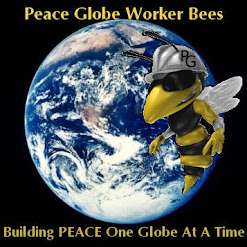A response
Posted: Thursday, August 13, 2009 by Travis Cody inI'm going to do something I don't normally do. And I'm doing it because I wanted to give my readers an opportunity to speak if they choose.
Last week I commemorated the bombings of Hiroshima and Nagasaki in August 1945. It was just a photograph, some facts, and this statement...
War is horrible. The decisions made during war have consequences.
That seems a fairly indisputable statement. Many of my blog pals weighed in with their opinions. And I think you came in on both sides of the argument, while agreeing that a) the debate is still ongoing about the use of atomic weapons and b) war is pretty terrible.
A new visitor to my place also felt compelled to comment. Evidently he took exception to my introductory statement about the debate over the bombings. The visitor wrote...
So when are you going to blog about the anniversary of the Rape of Nanking?
If the Japanese and others were/are so horrified by how we finished it, they shouldn't have started the damned conflict.
Spare me the sorrow over the use of those weapons. It was justified.
Thank you, Joshua, for having the courage of your convictions and owning your comment so I could track back to your blog. I always like to return visits.
As to your question, the events in Nanking happened in December 1937. If I choose to blog about a historical event, I generally do so closer to the actual commemoration or remembrance of the event. I also tend to blog about things of interest to me personally and specifically. If I haven't blogged about the Rape of Nanking previously, it doesn't mean I won't at some later date.
Joshua, I wonder at your absolute conviction. I don't admire it, as to me it demonstrates a closed mind. I also don't criticize you for it. However, consider your conviction that Japanese civilians somehow deserved to have those bombs dropped on them based on the actions of the Japanese Imperial Army at Nanking. By this logic, German civilians deserved the same fate for the systematic state sponsored murder of millions of Jews, Poles, Soviet POWs, Slavs, gays, disabled persons, and political opponents. I don't think that's true, but it's your logic.
We could continue your logic to include oppressive regimes throughout the nuclear era. Stalin killed millions of his own people. Perhaps Pol Pot and the Khmer Rouge deserved some too? Should we have used nuclear weapons on the apartheid regime in South Africa? Weren't we obligated to strategically bomb the perpetrators of the Rwandan genocide? Who should we bomb for the tragedies in Burma and Darfur?
I've never put much stock in the "you did this so you deserve that" argument. And since the events in Nanking occurred in 1937, prior to U.S. declared involvement in World War II, we had no military business "punishing" the Japanese for what they did in China. That was for the Nanking war crimes tribunal to review and adjudicate in 1946, as the Nuremberg trials from 1945-1946 reviewed and judged Nazi war crimes.
I don't mind that you believe strongly in your opinion. What I find bothersome is that you pound others over the head with it. Spare you the sorrow? They shouldn't have started it if they don't like how we finished it? Really?
When we start talking about retribution, we must regard the length and breadth of history. For example, how can we possible think we can insert ourselves into the issues between Middle Eastern or Southeast Asian or African nations to resolve thousands of years of conflict? Let me quote a friend of mine. Starrlight says...
...if we really wanna play tit for tat when it comes to Japan and China we have to go ALL the way back to Khan. Sino-Japanese relations are so ancient and have so many scars on both sides it is not even funny.Hey...do we retroactively nuke ourselves for our treatment of Native American people here on our own soil?
And while I completely agree that the level and methods of Japanese violence during WW II were every bit as horrific as what the Nazi did, I find it sad that his [she means you, Joshua] view is so myopic that he can not pull back and look at it from a species stand point and feel sorrow that humans went there to begin with. That we got to the point where using nuclear weapons was the best option SHOULD make everyone sorrowful.
Joshua returned later to write...
And you're wrong, the debate is over regarding the end of the war and saving lives. Anyone with an objective brain and a willingness to find the answers knows this.
Joshua, I see that you feel strongly about this. I may even agree that the use of atomic weapons against Japan was justified and that it saved lives. I can cite the statistics, and not just the projected Allied casualties but those of Asian nations where mostly civilians would have died from famine and disease while a prolonged invasion of Japan took place. But you didn't bring that side of the question to your comment. You didn't bring reason.
You made a declaration, Joshua. Why not say, "I think the debate is over regarding the end of the war and saving lives, because..."? Now that I can respect.
Instead you decided to throw an odd bit of logic at me and at my readers. Your strong conviction doesn't give you the right to be rude or to tell me I'm wrong. I have an objective and open mind, which is why I think that the debate continues. History is written by the victor, while the losing side of a conflict is often derided. As long as scholars continue to dig into what we take for granted as historical fact, I'll keep my mind open to new evidence.
I'm not talking about shouted opinions and convictions about perceived reality. I'm talking about new facts in previously private and unavailable documents. If we stop investigating historical events, we don't learn from them.
I'm much more likely to listen to another blog pal, Mike Golch, who also brings a conviction based on a set of facts tempered with compassion based on anecdotal evidence. He owns his opinion too, but he doesn't beat anyone into submission with it or tell anyone they are wrong to disagree. Mike says...
President Truman did what he felt best for our military.By useing the bomb,it did shorten the war,That I have no doubt.The use of those bombs did emotional harm to the Japanese population as did the occupational forces after the war.My Late Dad talked about it when I was growing up.He was proud to serve our country,he was saddend to see parts of Japan and the devatation the we had did with those 2 bombs.I pray that that monster is never used again.
He believes it. He owns it. I presume he bases this opinion on a review of the projected American casualties from an invasion of Japan. He sees it from an American military point of view. It seems like he has some human compassion for a terrible tragedy...some sorrow perhaps. And he doesn't have to tell anyone that they are wrong not to see it the way he does. That's a balanced conviction I can admire.
We also learn from those who disagree with us. I have opinions that I'll dig in and defend, but I'm not going to tell you you're wrong for your opinion, as long as it is fact based. I see articles by learned scholars, still asking questions and examining evidence about the use of atomic weapons in 1945. Therefore I conclude that the debate continues, and suggest that it may not be resolved.
Fifteen hundred years ago everybody knew the Earth was the center of the universe. Five hundred years ago, everybody knew the Earth was flat, and fifteen minutes ago, you knew that humans were alone on this planet. Imagine what you'll know tomorrow. (Tommy Lee Jones as Kay, Men In Black, 1997)
I won't even tell you you're wrong if you say the sun will rise in the east tomorrow...I think it will, but it might not. I'm pretty certain it will based on the evidence that it has since the planet started rotating around it. But it still might not. I don't know what's in store for this planet tomorrow.
Come with a reasoned and polite response, and I'm happy to entertain another idea.
That's my opinion. I own it. Thanks for dropping by.

















Compelling stuff, Trav. I love how you think and how you write. A quest for truth, tempered with compassion and a thirst for understanding.